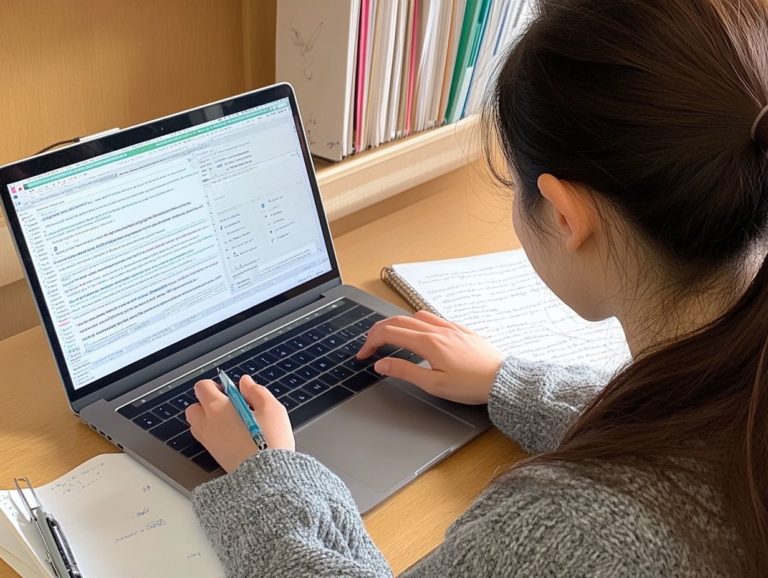Can I Interact with Instructors in Online Courses?
The world of education has undergone a remarkable transformation with the advent of online learning, granting access to a plethora of courses and flexible options tailored to individual needs.
As we navigate this virtual landscape, the role of instructors becomes ever more crucial. Let s dive into the exciting world of online courses, shedding light on the distinctions between traditional and online teaching methods, communication channels, and best practices for fostering effective student-instructor interactions.
It also examines the advantages of engaging with instructors, addresses common challenges faced, and provides valuable insights to elevate the online learning experience.
Contents
- Key Takeaways:
- The Rise of Online Learning
- The Role of Instructors in Online Courses
- Interacting with Instructors in Online Courses
- Benefits of Interacting with Instructors
- Challenges and Solutions for Interacting with Instructors
- Frequently Asked Questions
- Can I interact with instructors in online courses?
- What are some ways I can interact with instructors in online courses?
- Can I ask questions and get help from instructors in online courses?
- Do online courses have real-time interaction with instructors?
- What if I have technical issues during an online course and need to contact my instructor?
- Is it important to interact with instructors in online courses?
Key Takeaways:

- Online courses allow for direct interaction with instructors, just like traditional classroom settings.
- Communication channels such as email, discussion forums, and video conferencing provide opportunities to connect with instructors.
- Interacting with instructors in online courses leads to personalized learning and a better understanding of course material.
The Rise of Online Learning
The rise of online learning has significantly transformed the educational landscape, particularly after the COVID-19 pandemic.
We have witnessed how swiftly educational institutions, including community colleges, adapted to remote learning environments.
This shift has emphasized online courses and the incorporation of diverse digital tools and educational technologies, ultimately revolutionizing teaching methodologies and enriching learning experiences.
Exploring the Growth of Online Courses
The growth of online courses has surged remarkably, presenting university students with flexible options that enhance engagement and cater to diverse learning needs.
This trend owes much to advancements in learning management systems, which now boast user-friendly interfaces, interactive tools, and integrated resources designed to streamline educational experiences.
The popularity of asynchronous learning grants the freedom to access materials at one’s convenience, encouraging a more personalized educational journey tailored to individual pace.
Crucially, your feedback is vital to improving your learning experience! It allows educators to refine their offerings based on real-world experiences and preferences.
This collaborative approach enhances course effectiveness and aligns educational strategies with the ever-evolving demands of learners.
The Role of Instructors in Online Courses
In online courses, the instructor s role is pivotal, profoundly influencing the quality of teaching, student engagement, and the overall learning experience.
To excel, instructors can leverage a range of teaching methods that foster a supportive environment. This approach ensures that students feel connected, engaged, and informed throughout their asynchronous learning journey.
Traditional vs. Online Teaching Methods
Traditional classes and online teaching methods each offer unique advantages and challenges, particularly regarding student interaction and social presence elements critical for effective learning.
In a traditional setting, face-to-face communication facilitates immediate feedback and encourages spontaneous interactions among peers and instructors, creating a dynamic learning environment.
On the other hand, online teaching harnesses technology to connect students with educators and classmates from various locations, though it often lacks the personal touch that physical classrooms provide.
The communication style shifts dramatically between the two; traditional methods rely on verbal cues and body language, while online platforms primarily use written and visual communication. This difference can sometimes lead to misunderstandings.
These variations significantly impact learning objectives, as engagement strategies transition from hands-on activities to digital assignments, ultimately shaping the overall experience and connection to the content.
Explore your online learning options today and enhance your educational journey!
Interacting with Instructors in Online Courses

Engaging with instructors in online courses is crucial for elevating your learning experience.
Effective faculty interaction, facilitated through diverse communication channels, fosters meaningful academic dialogue and delivers timely feedback both of which are integral to your success as a student.
Available Communication Channels
As a student enrolled in online courses, you have access to various communication channels that make it easier to connect with your instructors. This accessibility allows you to seek help and engage in meaningful discussions with your peers and professors.
Consider the discussion boards, where you can post questions and contribute to ongoing dialogues. It’s a fantastic way to foster a sense of community among your fellow students.
Email offers a more formal route for reaching out to your instructors when you need clarifications or guidance on assignments.
For those moments when you crave immediate interaction, live chats provide real-time engagement, encouraging spontaneous discussions and quick feedback.
By embracing these diverse communication methods, you make academic interactions more dynamic and interactive. Ultimately, this enhances your learning experience and strengthens the rapport you build with your instructors.
Best Practices for Communication
Implementing best practices for communication in online courses can truly elevate the interaction dynamics between instructors and students.
This fosters a collaborative learning environment that prioritizes effective ways to give feedback.
By establishing clear course expectations from the very beginning, you lay a solid foundation that guides student participation and engagement. Maintaining a consistent communication style whether through weekly announcements, emails, or discussion forums ensures that students feel informed and connected.
Timely and constructive feedback from instructors cannot be overstated. It clarifies misconceptions and motivates students to actively engage in their learning journey.
You create a sense of community through ongoing dialogue, significantly enhancing the overall educational experience.
Benefits of Interacting with Instructors
Engaging with instructors in online courses offers a wealth of advantages, most notably a personalized learning experience that deepens your understanding of the course materials.
This interaction enriches your academic journey and encourages meaningful connections with faculty, ultimately leading to enhanced academic outcomes.
Personalized Learning Experience
A personalized learning experience flourishes when you receive tailored feedback and guidance from your instructors, significantly enhancing your academic outcomes.
In this dynamic environment, the flexibility of the curriculum allows for adaptive learning paths that cater precisely to your individual needs and preferences.
This level of customization fosters your engagement and empowers you to progress at your own pace.
Instructors play a vital role in your journey, employing diverse strategies, such as personalized assessments and regular check-ins, to ensure you have a clear understanding of your strengths and areas for improvement.
By analyzing performance data, they can offer timely feedback that encourages self-reflection and growth. Ultimately, this optimizes your overall learning experience.
Enhanced Understanding of Course Material

With effective instructor presence, you can achieve a deeper understanding of course materials, leading to greater engagement and better retention of information.
When educators actively involve you through interactive teaching methods think virtual discussions, polls, and group projects you re encouraged to step beyond passive learning.
This approach creates a sense of community and nurtures critical thinking and problem-solving skills, essential in today s fast-paced digital world.
For instance, using breakout rooms during online classes allows you to collaborate on assignments, share diverse perspectives, and receive immediate feedback from both your peers and instructors.
By maintaining regular engagement through weekly check-ins and personalized feedback, educators can significantly boost your motivation and clarity, ultimately enriching your online learning experience.
Challenges and Solutions for Interacting with Instructors
Engaging with instructors in online courses can pose several challenges, including technical glitches and the struggle to juggle time and availability. These issues can significantly affect your mental health and overall learning experience.
Overcoming Technical Difficulties
Overcoming technical challenges in online learning requires you to be skilled at using technology and able to easily use your learning platform. Problems can include annoying glitches that disrupt your access to course materials and connectivity issues that hinder your participation in live sessions.
To effectively tackle these issues, it s crucial for you to familiarize yourself with the troubleshooting tools offered by your learning platform, such as help centers or FAQs. Maintaining a reliable internet connection can significantly enhance your experience; consider investing in a stable router or opting for a wired connection to minimize interruptions.
Don’t let technical issues derail your learning! You can use online forums or study groups for extra help, as collaboration often leads to faster problem-solving.
Managing Time and Availability
Effective time management is essential for remote learning, and finding a delicate balance between course demands and your personal availability can greatly influence your overall engagement as a student.
To navigate this challenging landscape, prioritize tasks according to their deadlines and importance. This ensures that both your academic responsibilities and personal obligations receive the attention they deserve. A detailed schedule will act as your roadmap, enabling you to allocate specific time slots for studying, attending virtual classes, and engaging in extracurricular activities.
Establishing a routine creates a structured environment that enhances your focus and minimizes procrastination. Remember, incorporating breaks and downtime is essential it helps maintain your motivation and mental well-being, ultimately leading to a more rewarding educational experience.
Frequently Asked Questions
Can I interact with instructors in online courses?

Yes, most online courses have interactive features that allow students to communicate with instructors through messaging or discussion forums.
What are some ways I can interact with instructors in online courses?
Some common ways to interact with instructors in online courses include messaging, discussion forums, virtual office hours, and video conferences.
Can I ask questions and get help from instructors in online courses?
Yes, instructors are there to help and support students in online courses just like in traditional classroom settings. You can ask questions, seek clarification, and get additional help if needed.
Do online courses have real-time interaction with instructors?
While not all online courses have real-time interaction, some may offer virtual office hours or live Q&A sessions with instructors. This allows for more immediate communication and feedback.
What if I have technical issues during an online course and need to contact my instructor?
In case of technical issues, most online courses provide contact information for instructors so they can assist you in resolving any problems. You can also reach out to your school’s technical support team for assistance.
Is it important to interact with instructors in online courses?
Yes, interacting with instructors in online courses can help you better understand the material, get personalized feedback, and feel more connected to the course. It can also improve your overall learning experience.
If you have further questions or concerns, don t hesitate to reach out to your instructors or support team for assistance!






